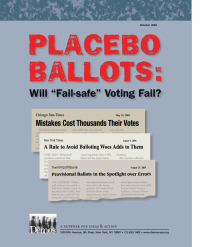Millions of citizens were disenfranchised in the 2000 election when they were denied their right to vote. In response, Congress passed the Help America Vote Act of 2002 (HAVA), which purported to correct many of the country's more egregious election problems. One of HAVA's signal promises was its so-called "fail-safe" voting provision. As of the first federal primary election this spring, no registered voter would be turned away from the polls because her name was not found on the voter lists. Similarly, those voters unable to show the identification required under another HAVA provision would also get an opportunity to cast a ballot. These erstwhile frustrated voters would be offered a provisional ballot.
That promise now looks empty for many thousands of new voters this November. States have seized upon the fine print of HAVA's "fail-safe" voting provision to again deny otherwise eligible Americans their right to participate in perhaps the most important choice put before the electorate in a generation. Congress left it to the states to determine how and whether to count these provisional ballots. In a recent national survey, Demos found that over half of the states have subverted the lofty goal of HAVA's provisional ballot requirement. Florida -- or one of 31 other states -- may again be the poster child for an ailing election system this November. Like patients sent home with a placebo, provisional voters in these states may think they are being given the vote, when in fact they are receiving a false promise.
